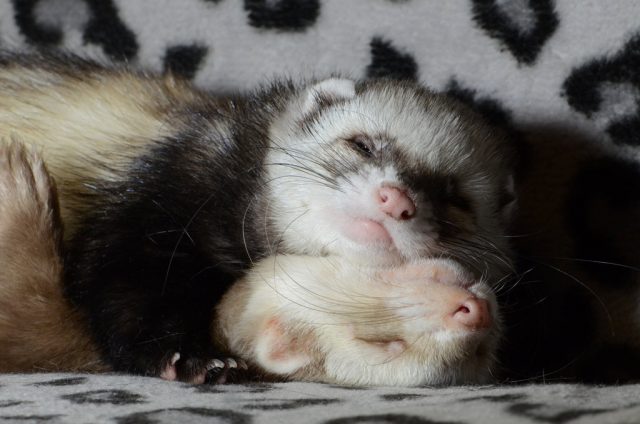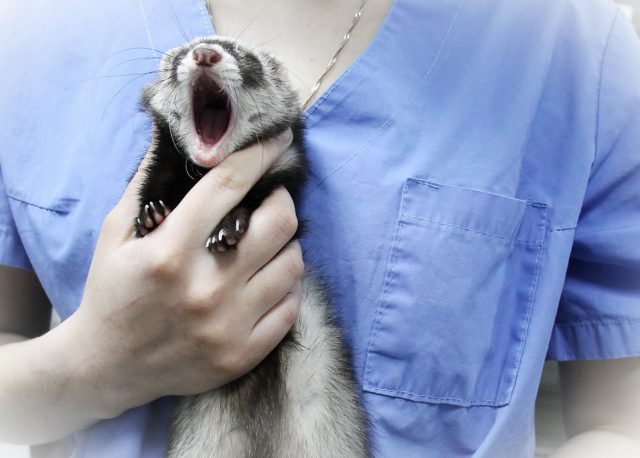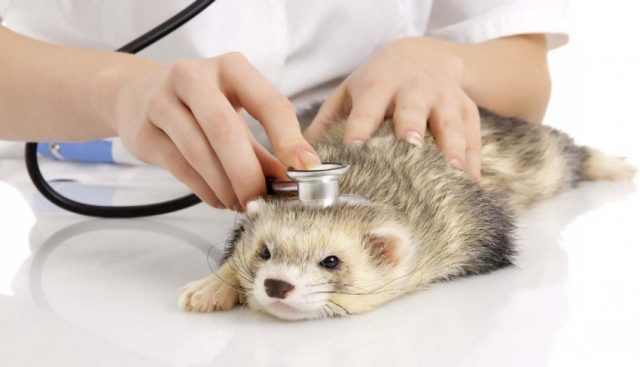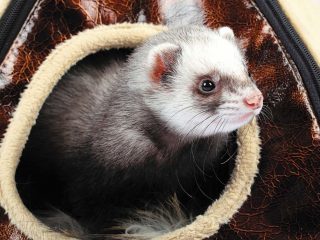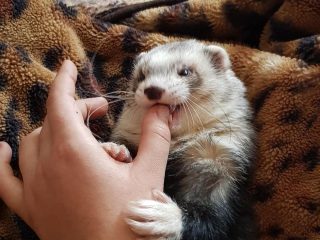Content
The most cheerful, friendly and quite funny pet is the ferret. Quite often, a wayward animal is exposed to colds, as a result of which the ferret sneezes violently, and a cough appears. Since the upper respiratory tract is most often affected by the disease, the pet owner should know what measures to take and how to recognize the disease in the early stages. It is very difficult for babies to tolerate illness, since their body is not yet strong enough and the immune system is weakened.
Why does a ferret sneeze or cough?
There are many reasons why a ferret starts sneezing and coughing. These include:
- bronchitis;
- colds;
- runny nose;
- cardiomyopathy;
- food allergic reaction;
- the presence of dust in the room;
- parasites.
In addition, it is worth taking into account the fact that the first signs of the disease in ferrets are very similar to the human symptoms of the common cold:
- if the ferret starts sneezing, it indicates an infection in the upper respiratory tract. As practice shows, the duration of an attack with the presence of sneezing can last up to 2-3 minutes, as a result of which the animal is very exhausted;
- in most cases the cough is dry and hard. A cough, like sneezing, can be accompanied by severe seizures;
- in some cases, you can observe the presence of a runny nose, an increase in body temperature. In a healthy state, the temperature of a ferret can vary from +37.5 to + 39 ° C. In addition, diarrhea may appear.
During illness, the ferret's activity decreases, the animal becomes lethargic, does not show the initiative as before. The condition becomes feverish, appetite disappears.
Bronchitis, colds, runny nose
If the ferret coughs and sneezes regularly, it could be caused by a cold. As a rule, this is a dry cough, which gives way to a wet one, as a result of which mucus begins to flow from the nose. In such situations, you must immediately contact a veterinary clinic or start self-treatment of your pet.
To prevent cough and the development of the disease, it is recommended to use "Fosprenil" and "Maxidin", drugs must be injected intramuscularly. Since the animals are small, it is worth taking insulin syringes, so that the pain caused will be small.
These drugs must be administered 3 times daily using 0.2 ml of the drug. The course of treatment lasts a week. After the pet is back on its feet, many veterinarians recommend injecting 0.1 ml of Gamavit for 30 days. This drug helps to strengthen the ferret's immune system.
If the disease is started, it can develop into bronchitis. As a rule, bronchitis most often occurs in old ferrets and animals that have problems with internal organs, for example, a weakened heart or lungs. As practice shows, you cannot cure bronchitis at home on your own, as a result of which it is recommended to immediately take your pet to a veterinary clinic.
With a runny nose, the animal begins to sneeze, as the lungs try to push out the bacteria that enter them from the nasal cavity.With an advanced runny nose, the ferret begins to cough, as the mucus enters the nasopharynx, as a result of which the animal tries to get rid of the mucus with a strong cough. There can be several reasons for the disease: infection in the nasal sinus, the presence of inflammatory processes due to a draft.
As soon as it was noticed that the ferret is breathing heavily, constantly sneezing and coughing, while mucus is released from the nose, it is necessary to rinse the nose, having previously cleaned it. For such purposes, use "Nazivin" or "Naphtizin" - 0.05% solution. Each nostril will need to pour about 0.1 ml of the drug.
In addition, if necessary, you can prepare your own solution for rinsing the nose. To do this, you need to take the following drugs - "Dioxidin", "Albucid" and "Dexamethasone", and then mix in proportions of 10: 1: 1 ml. It is recommended to inject this solution 2 times daily, using 0.1 ml of the drug for each nostril.
Cardiomyopathy
Cardiomyopathy is also called cardiac cough. As a rule, a cough provokes a weakening of the heart muscles. Gradually, the walls of the muscles become thin, as a result of which the ferret's body becomes weakened, the pressure decreases. Since blood circulation is rather slow, oxygen does not have time to be absorbed into the walls of the lungs, and begins to condense. It is the accumulation of condensation that causes a severe cough.
Among the symptoms of the disease are the following:
- decreased activity of the animal;
- severe coughing on a regular basis;
- increased body temperature.
It is important to understand that these symptoms are not enough to diagnose the disease at home, as a result of which it is recommended to take your pet for examination to a veterinary clinic.
You can cure cardiomyopathy as follows:
- The first step is to give the ferret a diuretic, which will allow the body to get rid of excess moisture. In this case, it is best to use "Furosemide".
- After 24 hours, it is recommended to introduce "Captopril", which will expand the vessels. Many experts recommend using the drug in tablets.
- After 2 days, you need to transfer your pet to medicated feed.
- Throughout the entire period of treatment, the animal should be given warm water, into which granulated sugar is previously added.
The treatment process is quite complicated and if you feel like you can't cope on your own, it is best to entrust the ferret treatment to professionals.
Food allergy
Another reason the ferret sneezes and coughs frequently is allergies. As a rule, food allergies appear unexpectedly in an animal. If the animal has lost its appetite, it does not eat as actively as before, but at the same time before and after eating it feels great, runs and frolics, then this should be a signal to revise the pet's diet.
A common cause of a food allergic reaction is the fact that the owner gives his pet food that is contraindicated for a ferret. That is why you need to carefully approach the choice of products: what can and cannot be given to a wayward pet.
Dust
The most common reason a ferret has a cough and constant sneezing is common indoor dust. Practice shows that sneezing is a natural process. For example, at the moment when the animal is washing or actively playing, you can hear him quietly sneeze or cough. You should not immediately sound the alarm, you must first take a closer look at how the animal behaves, whether it has lost its appetite, is it just as active as it often sneezes and coughs.It is important to understand that not every sneeze is a sign that a ferret has a cold. You should be wary at the moment when he sneezes or coughs more than 7 times in a row. In all other cases, there is no cause for concern.
Parasites
Another reason the ferret sneezes and coughs is for parasites such as hookworms. They parasitize the respiratory system. The lungs, reacting to nematodes, try to get rid of them, resulting in a severe cough in the animal.
As a rule, due to the appearance of worms, the animal also loses its appetite, apathy sets in, and this can often be fatal.
The first signs of the appearance of parasites are severe coughing and shortness of breath, even if the pet is calm. In the later stages of the disease, the body temperature may rise. For treatment, it is recommended to use anthelmintic drugs for cats.
Prevention measures
For the prevention of a number of diseases, it is recommended to provide your pet with appropriate living conditions. As a rule, the ferret should live clean. The diet should include quality food, be complete and varied. If other animals live at home that are susceptible to the disease, then it is worth preventing the ferret from contact with them. During the period of indisposition, it is not recommended to take the animal in your arms, it is worth creating a quiet and calm atmosphere for it.
Conclusion
If the ferret sneezes or coughs violently, these are the first signs that something is bothering the animal. As a rule, if sneezing is infrequent and rarely heard, then it may be caused by the presence of dust in the room. If sneezing and coughing are heard more often 5-6 times a day, then it is worth monitoring the ferret's behavior and identifying changes in behavior. Often, with colds, a ferret may have a rise in body temperature, lacrimation may begin, it will become lethargic, and its appetite will disappear. In such situations, it is recommended that you immediately contact your veterinarian and start treating your pet.
